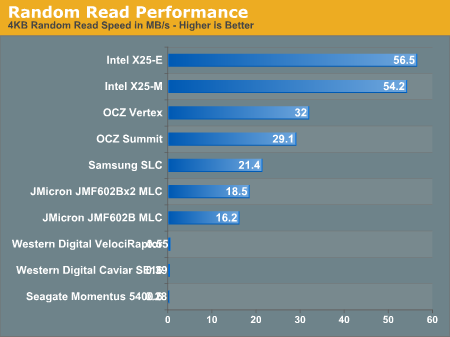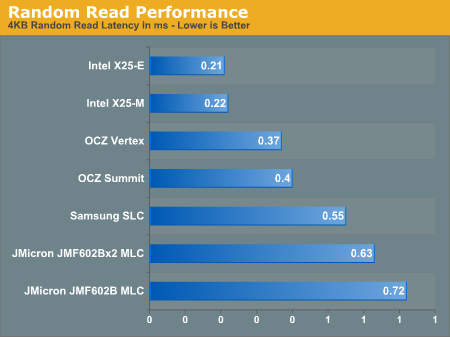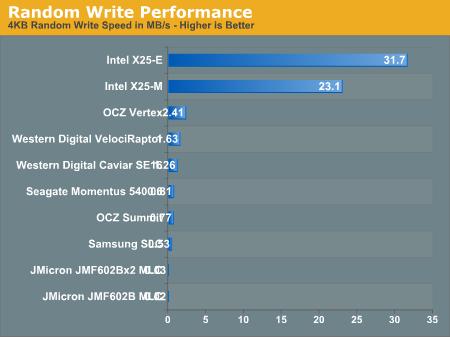The SSD Anthology: Understanding SSDs and New Drives from OCZ
by Anand Lal Shimpi on March 18, 2009 12:00 AM EST- Posted in
- Storage
Random Read/Write Performance
Arguably much more important to any PC user than sequential read/write performance is random access performance. It's not often that you're writing large files sequentially to your disk, but you do encounter tons of small file reads/writes as you use your PC.
To measure random read/write performance I created an iometer script that peppered the drive with random requests, with an IO queue depth of 3 (to add some multitasking spice to the test). The write test was performed over an 8GB range on the drive, while the read test was performed across the whole drive. I ran the test for 3 minutes.

The three hard drives all posted scores below 1MB/s and thus aren't visible on our graph above. This is where SSDs shine and no hard drive, regardless of how many you RAID together, can come close.
The two Intel drives top the charts and maintain a huge lead. The OCZ Vertex actually beats out the more expensive (and unreleased) Summit drive with a respectable 32MB/s transfer rate here. Note that the Vertex is also faster than last year's Samsung SLC drive that everyone was selling for $1000. Even the JMicron drives do just fine here.
If we look at latency instead of transfer rate it helps put things in perspective:

Read latencies for hard drives have always been measured in several ms, but every single SSD here manages to complete random reads in less than 1ms under load.
Random write speed is where we can thin the SSD flock:

Only the Intel drives and to an extent, the OCZ Vertex, post numbers visible on this scale. Let's go to a table to see everything in greater detail:
| 4KB Random Write Speed | |
| Intel X25-E | 31.7 MB/s |
| Intel X25-M | 23.1 MB/s |
| JMicron JMF602B MLC | 0.02 MB/s |
| JMicron JMF602Bx2 MLC | 0.03 MB/s |
| OCZ Summit | 0.77 MB/s |
| OCZ Vertex | 2.41 MB/s |
| Samsung SLC | 0.53 MB/s |
| Seagate Momentus 5400.6 | 0.81 MB/s |
| Western Digital Caviar SE16 | 1.26 MB/s |
| Western Digital VelociRaptor | 1.63 MB/s |
Every single drive other than the Intel X25-E, X25-M and OCZ's Vertex is slower than the 2.5" Seagate Momentus 5400.6 hard drive in this test. The Vertex, thanks to OCZ's tweaks, is now 48% faster than the VelociRaptor.
The Intel drives are of course architected for the type of performance needed on a desktop/notebook and thus they deliver very high random write performance.
Random write performance is merely one corner of the performance world. A drive needs good sequential read, sequential write, random read and random write performance. The fatal mistake is that most vendors ignore random write performance and simply try to post the best sequential read/write speeds; doing so simply produces a drive that's undesirable.
While the Vertex is slower than Intel's X25-M, it's also about half the price per GB. And note that the Vertex is still 48% faster than the VelociRaptor here, and multiple times faster in the other tests.










250 Comments
View All Comments
strikeback03 - Thursday, March 19, 2009 - link
If you get Newegg's specials, one of the codes is for the 30GB for $103 with a $20MIR, so $83 with shipping if the rebate comes through. At the size I would want (~120) the Super Talent undercuts the OCZ slightly.Does anyone know if you can install the firmware of one maker to another maker's SSD? For example, assuming both the Ultradrive ME and the Vertex use the same Indilinx controller, and say Super Talent chose to release it with the firmware which optimizes for higher sequential speeds, would the user be able to choose the firmware which optimizes for less latency?
Testtest - Wednesday, March 18, 2009 - link
Ah, no editing?!A-Data's "300 plus" SSD also uses the Indilinx controller.
vailr - Wednesday, March 18, 2009 - link
"The Anatomy of a SSD" should instead read: "The Anatomy of an SSD"Flunk - Wednesday, March 18, 2009 - link
Yes, because S is a vowel...abudd - Wednesday, March 18, 2009 - link
Assuming SSD = "es-es-dee" then "an SSD" is right. If it *sounds* like a vowel, use "an".JarredWalton - Wednesday, March 18, 2009 - link
Yes, *but* SSD could also be read as "Solid State Drive" instead of "ess ess dee", in which case you would say "a SSD". I tend to read it as "ess ess dee", but Anand thinks of those letters as "Solid State Drive".Potato, potato, tomato, tomato... let's call the whole thing off!
Azsen - Thursday, March 19, 2009 - link
When reading acronyms you're supposed to think of them as the letters, i.e. when you see RAM, you think "ram" straight off not Random Access Memory. When you see "IBM" you think "eye bee emm" not International Business Machines etc etc. It would take ages to read an article if you had to stop and think out all the full wording of acronyms as you're reading them.I'm going with the correction of "Anatomy of an SSD". Correct English fullstop.
JarredWalton - Thursday, March 19, 2009 - link
By your comment, you suggest two different things, and that's really okay. That was my point: when you see "RAM" you probably thing "ram" as in the animal... not "Are A Em". You say "a RAM stick" not "an RAM stick". I'd guess most people think of SATA as "Ess A Tee A", but if you talk to most computer techs that are in the know, it's "say-te" so you would say "a SATA drive".And you know, I'm sure plenty of people will agree with the correct way of saying SATA, and that's perfectly okay. English really is a very flexible thing - particularly in the tech world - and rarely is there an "always right" way of saying things. If Anand wants to say "a SSD" and others want to say "an SSD", I'm not going to try to declare one group or the other correct. They both are, depending on your viewpoint.
"I believe the world is neither black nor white, but only shades of gray."
Pythias - Friday, March 20, 2009 - link
Can't have gray without black and white.7Enigma - Wednesday, March 18, 2009 - link
HAHAHA. What a tool. I love it when people critique grammar.....and get it wrong.